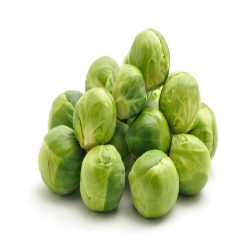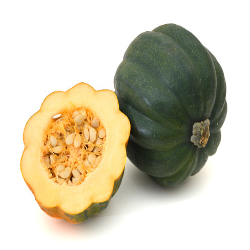Brussel sprouts Nutrition facts
Brussel sprouts

Brussel sprouts are tiny, leafy green buds resembling like miniature cabbages in appearance. They nonetheless are exceptionally rich sources of protein, dietary fiber, vitamins, minerals, and antioxidants. In fact, a renewed interest is emerging among the scientific community about health benefits of brussels-sprouts have to offer.
Botanically, the sprouts belong to the same Brassica family of vegetables which also includes cabbage, collard greens, broccoli, and kale. Scientific name: Brassica oleracea (Gemmifera Group).
Brussels sprouts are winter crops flourishing well under cool weather and light frosting conditions. The well-grown plant reaches about 90 cm in height. The sprouts develop all along the stalk, starting from the base and moving upward. Each sprout, in general, features similarity in appearance and structure to cabbage, but only minuscule in size, measuring about 1-1.5 inches in diameter.
Similar Food
-
 Acorn squash 40 Cal
Acorn squash 40 Cal -
 Amaranth greens 23 Cal
Amaranth greens 23 Cal -
 Artichoke 47 Cal
Artichoke 47 Cal -
 Arugula 25 Cal
Arugula 25 Cal -
 Asparagus 20 Cal
Asparagus 20 Cal
Source of Calorie
-
Carbs8.95 g 69%
-
Protein3.38 g 26%
-
Fat0.30 g 5%
How long to burn off 43 Calories?
*Approximate base minutes for a 25-year-old, 65 kg adult at moderate intensity.
| Nutrition Principle | Nutrition Value | Percentage of RDA |
|---|---|---|
| Principle | ||
| Energy | 43 Kcal | 2% |
| Carbohydrates | 8.95 g | 7% |
| Protein | 3.38 g | 6% |
| Total Fat | 0.30 g | 1% |
| Cholesterol | 0 mg | 0% |
| Dietary Fiber | 3.80 g | 10% |
| Vitamins | ||
| Folates | 61 µg | 15% |
| Niacin | 0.745 mg | 4.5% |
| Pantothenic acid | 0.309 mg | 6% |
| Pyridoxine | 0.219 mg | 17% |
| Riboflavin | 0.90 mg | 7% |
| Thiamin | 0.139 mg | 13% |
| Vitamin A | 754 IU | 25% |
| Vitamin C | 85 mg | 142% |
| Vitamin K | 177 µg | 147% |
| Electrolytes | ||
| Sodium | 25 mg | 1.5% |
| Potassium | 389 mg | 8% |
| Minerals | ||
| Calcium | 42 mg | 4% |
| Copper | 0.70 mg | 8% |
| Iron | 1.40 mg | 17.5% |
| Magnesium | 23 mg | 6% |
| Manganese | 0.337 mg | 15% |
| Phosphorus | 69 mg | 10% |
| Selenium | 1.6 µg | 3% |
| Zinc | 0.42 mg | 4% |
| Phyto-nutrients | ||
| Carotene-α | 6 µg | -- |
| Carotene-ß | 450 µg | -- |
| Crypto-xanthin-ß | 0 µg | -- |
| Lutein-zeaxanthin | 1590 µg | -- |